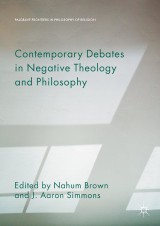Details

Contemporary Debates in Negative Theology and Philosophy
Palgrave Frontiers in Philosophy of Religion
|
96,29 € |
|
| Verlag: | Palgrave Macmillan |
| Format: | |
| Veröffentl.: | 24.11.2017 |
| ISBN/EAN: | 9783319659008 |
| Sprache: | englisch |
Dieses eBook enthält ein Wasserzeichen.
Beschreibungen
<p>In this volume, scholars draw deeply on negative theology in order to consider some of the oldest questions in the philosophy of religion that stand as persistent challenges to inquiry, comprehension, and expression. The chapters engage different philosophical methodologies, cross disciplinary boundaries, and draw on varied cultural traditions in the effort to demonstrate that apophaticism can be a positive resource for contemporary philosophy of religion.</p>
<p>1. Introduction; J. Aaron Simmons. - <b>Part I. A Philosophy of the Unsayable</b>.- 2. A Philosophy of the Unsayable; Kevin Hart.- 3.Speaking About Silence (Sort of); Aaron Simmons.- 4. William Franke and the Unfinished Philosophical Revolution of the West; William C. Hackett.- 5. To Be and Not To Know, That is the Question; Sai Bhatawadekar.- 6. Is There a Logic of the Ineffable?; Stephen Palmquist.- 7. Betwixt and Amidst; William Franke.- <b>Part II. Thinking the Apophatic</b>.- 8. Is Hegel an Apophatic Thinker?; Nahum Brown.- 9. Hegel and the Negation of the Apophatic; Andrew W. Hass.- 10. Infinite Reduplication; Peter Kline.- 11. Heidegger’s Apophaticism; Elliot R. Wolfson.- 12. The Apophatic Trace of Derrida and Zhuangzi; Lissa McCullough.- 13. The Irenic Ironic Unsayable; by David Chai.- 14. Apophatic Universalism East and West; William Franke.- <b>Part III. The Vanishing Point of the Apophatic in Poetry and Literature</b>.- 15. Apophasis as a Means of Expressing EcologicalIndeterminacy; Sabine Lenore Müller.- 16. The Astonishing Silence of Things;Bruno Béu.- 17. Unspeakable Trash; Anthony Curtis Adler.- 18. Conclusion.- Index.</p><p></p>
<b>Nahum Brown</b> is a visiting Assistant Professor at the Hong Kong University of Science and Technology, Hong Kong<br/><p><b>J. Aaron Simmons</b> is Associate Professor of Philosophy at Furman University, USA</p>
<p>In this volume, scholars draw deeply on negative theology in order to consider some of the oldest questions in the philosophy of religion that stand as persistent challenges to inquiry, comprehension, and expression. The chapters engage different philosophical methodologies, cross disciplinary boundaries, and draw on varied cultural traditions in the effort to demonstrate that apophaticism can be a positive resource for contemporary philosophy of religion.<br/></p>
Considers the relevance of negative theology and apophatic thinking in today's society Offers insights that are relevant for continental philosophy, theology, comparative literature, metaphysics, and intercultural philosophy Provides historical contextualization of thinking from Ancient Platonic and Neo-Platonic debates to the 19th century Includes supplementary material: sn.pub/extras
<p>Considers the relevance of negative theology and apophatic thinking in today's society</p><p>Offers insights that are relevant for continental philosophy, theology, comparative literature, metaphysics, and intercultural philosophy</p><p> </p><p>Provides historical contextualization of thinking from Ancient Platonic and Neo-Platonic debates to the 19th century</p>
“Many excellent voices contribute to a nuanced and diverse anthology on the crucial role of apophatic thought for the philosophy of religion. It is impressive not only for its sophistication but for its range: postmodern, continental, and analytical philosophy; modernist poetry; as well as some attention to the importance of multi-religious perspectives. A fine contribution to this field - few will leave this volume without having their knowing (and unknowing) challenged and deepened.” (Wendy Farley, San Francisco Theological Seminary, USA, and author of Gathering Those Driven Away: A Theology of Incarnation, and The Thirst of God: Contemplating God’s Love with Three Women Mystics) <p>“Unlimited confidence in the power of philosophers to express ultimate reality and despair at the inevitable failure of our philosophic tools to handle ultimate reality mark the death of philosophy of religion through irrelevance and futility, respectively. A meaningful future for philosophy of religion lies between these extremes, as we bend philosophy toward effing the ineffable. This book charts key debates in this promising middle space. It is a must-read for anyone interested in apophaticism.” (Wesley J. Wildman, Boston University, USA, and author of In Our Own Image: Anthropomorphism, Apophaticism, and Ultimacy, and Effing the Ineffable: Existential Mumblings at the Limits of Language)</p><p></p> <p>“There is a difference between a kiss and the word “kiss,” between a pipe and a picture of a pipe. And this difference between our signs and that to which they point is important for all those religious communities who use words to point to a reality that is more than verbal. This volume of insightful essays on philosophy of the apophatic helps us think about what exists outside of language—and how to talk about it.” (Kevin Schilbrack, Appalachian State University, USA, and author of Philosophy and the Study of Religions: A Manifesto)</p>
Diese Produkte könnten Sie auch interessieren:

Philosophy and Religion in German Idealism

von: William Desmond, Ernst-Otto Onnasch, Paul Cruysberghs

96,29 €















